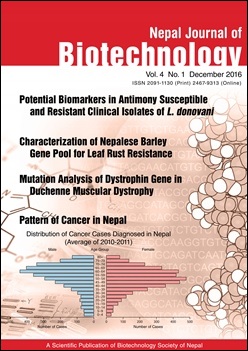Hormonal Effect on Mandarin Orange (Citrus reticulata Blanco) Micro-propagation
DOI:
https://doi.org/10.3126/njb.v4i1.16344Keywords:
mandarin orange, Citrus reticulata, in-vitro shooting, hormone, callusingAbstract
Tissue culture is the best option to produce disease free seedling of the fruit crop rapidly. Micro-propagation and use of the in-vitro grafting (micro-grafting) is very helpful for production of virus free planting materials in mandarin. Different levels of the in-vitro hormone affect the success of callusing, shooting and plant regeneration in mandarin. Shoot bud, flower bud and in-vitro seedling epicotyl was used as explants to study the hormonal effect on mandarin micro-propagation. Similarly, 10 levels of BAP and IAA combination on MS media for mandarin tissue culture were used. Observation was done for 100 test tubes per treatment combination after 4, 8 and 12 weeks of culture. Data was arc sine transformed for analysis. Shooting from explants was significantly higher (71.72%) on medium level of the BAP (0.5 mg/L) and IAA (0.2 mg/L) using in-vitro seedling stem as explant, however, it was 27.91% for stem bud as explant. Stem bud showed higher level of callusing (6.15%, p<0.001) in mandarin orange. However, flower bud didn’t develop shoot in mandarin tissue culture. Increment of the in-vitro regeneration of the shooting and callusing was observed by the increment of the in-vitro incubation duration in mandarin orange tissue culture.Downloads
Downloads
Published
How to Cite
Issue
Section
License
Copyright Notice:
The manuscript submitted to NJB must be an original contribution, not previously published and should not be under consideration for publication elsewhere. When the manuscript is accepted for publication, the authors agree to automatically transfer the copyright of the article to the publisher. It should grant permission to any third party, in advance and in perpetuity, the right to use, reproduce or disseminate your article, according to the NJB copyright and license agreement.
Authors transfer copyright to the publisher as part of a journal publishing agreement but have the rights to: Share their article for Personal Use, Internal Institutional Use and Scholarly Sharing purposes, with the NJB applies the Creative Commons Attribution-NonCommercial CC BY-NC license to all the works we publish after Jun 2020 (Before it was CC BY-NC-ND). Under this license, authors agree to make articles legally available for reuse, without permission or fees, for virtually any non-commercial purpose. Anyone may remix, adapt, and build upon your work non-commercially, and although their new works must also acknowledge you and be non-commercial, they don’t have to license their derivative works on the same terms. More details on CC BY-NC refer to its Licence Deed and Legal Code.






